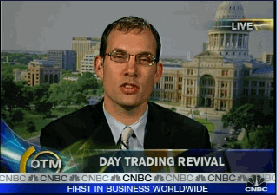Day Trading: The CNBC Debate
As I watched CNBC’s clip on the return of day trading Friday, I was entertained by the banter. On one side was Trey Robinson, an acquaintance of mine from CyberTrader who just happens to be the Director of Business Development (who would possibly know more about the scope of traders in the market today?). On the other side of the argument was Michael Farr, a long-term portfolio manager who clearly knows very little about day traders being that he only deals with buy-and-hope hold investors.
Day Trading Differently
Trey discussed the higher net-worth clients that are accounting for the increased level of day trading in recent months (there has been a lot of buzz lately regarding this), and it’s not surprising to hear that much of today’s trading crowd is notably different than the bubble crowd of several years ago.
 Trey Robinson of CyberTrader discusses today’s day trader on CNBC. (Click image to launch video)
Trey Robinson of CyberTrader discusses today’s day trader on CNBC. (Click image to launch video)By taking a portion of their portfolio to day trade, the new crowd is able to diversify their timeframe rather than just attempt to match the market’s returns over time. They’re also using sophisticated tools to help execute their trading strategy while reducing risk. Truly a sophisticated new breed of day traders, no doubt.
Long-Term Investing Contradictions
As Michael started to speak about day traders, he wasted little time before jumping right to unfounded claims such as “these people are speculating and not investing,” and that “when the music stops, it’s over.” He also added that “when the general trend turns down, these people don’t make money.”
How ironic! He failed to mention that a long-term investor such as himself can indeed suffer considerable losses during a market correction, especially considering how few are hedged or short selling the way most day traders do. It’s also interesting to note that his long-term investors can be at greater risk than a day trader during a downturn, especially considering that they are mostly invested at all times and a day trader can take a position in cash (thereby preserving capital, not losing it).
Michael also failed to mention that even long-term investing also involves a level of speculation. After all, what guarantee does any investor have that his choice of investment (whether day trading or long-term investing) will produce a profit as expected? There are no guarantees in the stock market, regardless of timeframe.
Day Trading Reduces Exposure to Risk
On Friday at TheStockBandit.com, some members and I were discussing on my trading blog the sizeable downside gap in HAR after the company had reported earnings. Interestingly, a day trader would have had no exposure to the risk of an earnings gap which occurs overnight, but the long-term “investor” would have felt the full sting.
Same thing for the incredible downside market gap which followed 9/11: no harm to the pure day traders, but long-term investors needed considerable time to recover.
It’s pretty clear that even long-term investing involves significant risk (geopolitical event risk, earnings gaps, analyst downgrades, etc.), but one can easily argue that day trading reduces the exposure to risk due to the limited holding periods. Who can disagree with that?
Jeff White
President, The Stock Bandit, Inc.
www.TheStockBandit.com
[tags]Stock Trading, Day Trading, CNBC, Stock Market[/tags]







Brian Schumacher | Jan 29, 2007 | Reply
Jeff,
I did not see the CNBC piece on this. I chuckled while reading your post, regarding Mr. Farr’s comments. He should not comment on something he is completely ignorant on.
Personally, I have systems that daytrade, as well as systems that hold medium-term. This gives me more diversification, and the ability to adjust to changing markets.
TheStockBandit | Jan 29, 2007 | Reply
Hey Brian,
My mouth can get me into trouble when I try to discuss something I am ignorant about, but I’d like to think that on national TV I would not just make things up as I go along, but Farr didn’t have any basis to what he was saying. Poor guy!
I’m with you and agree it is important to diversify timeframes for investing/trading. That only serves to provide more input on how the market is moving across timeframes, but also helps when performance is sub-par in either effort as one can pick up the slack from the other if needed.
Thanks for your input!
Jeff